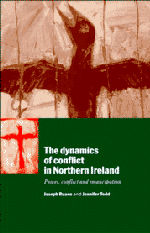Book contents
- Frontmatter
- Contents
- List of figures
- List of tables
- Preface
- 1 Introduction
- 2 Historical formations
- 3 The reconstruction of communal division
- 4 Ideology and conflict
- 5 The dynamics of conflict: politics
- 6 The dynamics of conflict: the economy
- 7 The dynamics of conflict: culture
- 8 The British context of the Northern Ireland conflict
- 9 The Republic of Ireland and the conflict in Northern Ireland
- 10 The international context
- 11 An emancipatory approach to the conflict
- Epilogue
- Appendix
- Bibliography
- Index of names
- Index of subjects
2 - Historical formations
Published online by Cambridge University Press: 18 December 2009
- Frontmatter
- Contents
- List of figures
- List of tables
- Preface
- 1 Introduction
- 2 Historical formations
- 3 The reconstruction of communal division
- 4 Ideology and conflict
- 5 The dynamics of conflict: politics
- 6 The dynamics of conflict: the economy
- 7 The dynamics of conflict: culture
- 8 The British context of the Northern Ireland conflict
- 9 The Republic of Ireland and the conflict in Northern Ireland
- 10 The international context
- 11 An emancipatory approach to the conflict
- Epilogue
- Appendix
- Bibliography
- Index of names
- Index of subjects
Summary
The conflict in Northern Ireland has its roots in developments in Europe, Britain and Ireland during the sixteenth and seventeenth centuries which set Irish society and Irish–British relations in a conflictual mould. We conceptualise this in terms of the emergence of an internally conflictual system of relationships linking the two islands. We examine the origins of this system of relationships and trace its development to the partition of Ireland in 1921. Our approach is analytical and thematic rather than purely chronological.
Origins
From the late fifteenth century a new order was emerging in Europe out of the crisis of medieval feudalism. Its economic base was a more productive and commercialised agriculture, a rising population, improved communications, expanding trade and commerce and a renewed penetration of Europe's peripheral regions. Its political expression was the forging of a system of territorial states as the leading monarchs strengthened their power within their kingdoms, annexed previously autonomous political entities, and defended themselves against internal and external enemies. The new order expressed itself culturally in the shattering of the single overarching church-centred world of medieval Christendom by the reformation and in the slow and uneven emergence of national cultures and nations.
Simultaneously Europe was extending beyond its traditional boundaries in a process of colonisation and of empire building. The movement beyond Europe followed an earlier phase of ‘internal’ colonisation and was spearheaded by the Atlantic states – Portugal, Spain, France, England and Holland. Merchants, adventurers, soldiers, rulers and administrators created networks of trade and government linking Europe, Africa and the colonies of the New World, turning the Atlantic ocean into a European sea.
- Type
- Chapter
- Information
- The Dynamics of Conflict in Northern IrelandPower, Conflict and Emancipation, pp. 16 - 48Publisher: Cambridge University PressPrint publication year: 1996



